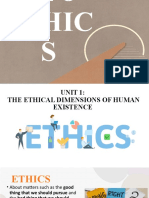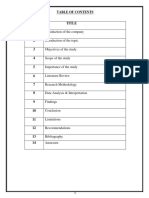0 ratings0% found this document useful (0 votes)
29 viewsEthics Exam Reviewer: Wonders As To What Constitutes The Whole Reality
Ethics Exam Reviewer: Wonders As To What Constitutes The Whole Reality
Uploaded by
Mary Jessica Uy1. Ethics examines concepts of right and wrong, and how they apply to human behavior and decision-making. It considers both moral obligations and ideals.
2. There are normative and descriptive approaches to ethics. Normative ethics examines what standards people should use. Descriptive ethics reports how people actually make moral judgments.
3. Sources of ethical authority include law, religion, and culture. Religions often provide both prohibitions and ideals. Cultural relativism holds that what is ethical varies by culture.
Copyright:
© All Rights Reserved
Available Formats
Download as PDF, TXT or read online from Scribd
Ethics Exam Reviewer: Wonders As To What Constitutes The Whole Reality
Ethics Exam Reviewer: Wonders As To What Constitutes The Whole Reality
Uploaded by
Mary Jessica Uy0 ratings0% found this document useful (0 votes)
29 views3 pages1. Ethics examines concepts of right and wrong, and how they apply to human behavior and decision-making. It considers both moral obligations and ideals.
2. There are normative and descriptive approaches to ethics. Normative ethics examines what standards people should use. Descriptive ethics reports how people actually make moral judgments.
3. Sources of ethical authority include law, religion, and culture. Religions often provide both prohibitions and ideals. Cultural relativism holds that what is ethical varies by culture.
Original Title
Untitled
Copyright
© © All Rights Reserved
Available Formats
PDF, TXT or read online from Scribd
Share this document
Did you find this document useful?
Is this content inappropriate?
1. Ethics examines concepts of right and wrong, and how they apply to human behavior and decision-making. It considers both moral obligations and ideals.
2. There are normative and descriptive approaches to ethics. Normative ethics examines what standards people should use. Descriptive ethics reports how people actually make moral judgments.
3. Sources of ethical authority include law, religion, and culture. Religions often provide both prohibitions and ideals. Cultural relativism holds that what is ethical varies by culture.
Copyright:
© All Rights Reserved
Available Formats
Download as PDF, TXT or read online from Scribd
Download as pdf or txt
0 ratings0% found this document useful (0 votes)
29 views3 pagesEthics Exam Reviewer: Wonders As To What Constitutes The Whole Reality
Ethics Exam Reviewer: Wonders As To What Constitutes The Whole Reality
Uploaded by
Mary Jessica Uy1. Ethics examines concepts of right and wrong, and how they apply to human behavior and decision-making. It considers both moral obligations and ideals.
2. There are normative and descriptive approaches to ethics. Normative ethics examines what standards people should use. Descriptive ethics reports how people actually make moral judgments.
3. Sources of ethical authority include law, religion, and culture. Religions often provide both prohibitions and ideals. Cultural relativism holds that what is ethical varies by culture.
Copyright:
© All Rights Reserved
Available Formats
Download as PDF, TXT or read online from Scribd
Download as pdf or txt
You are on page 1of 3
ETHICS EXAM REVIEWER
Meaning of Ethics ➢ Matters that concern life
➔ Generally speaking, it is about and death such as war,
matters such as the good things capital punishment, or
that we should pursue and the abortions and matters
bad things that we should avoid. that concern human
➔ The right ways in which we well-being such as
could or should act and the poverty, inequality, or
wrong ways of acting. sexual identity are often
➔ It is about what is acceptable and included in the
unacceptable in human discussion of ethics.
behavior.
➔ It may involve obligations that Ethics and Morals
we are expected to fulfill, ➢ Morals - refer to specific beliefs
prohibitions that we are or attitudes that people have or
required to respect, or ideals that to describe acts that people
we are encouraged to meet. perform. Thus, it is sometimes
➔ As a subject, it is about said that an individual’s personal
determining the grounds for the conduct is referred to as his
values with particular and morals, and if he falls short of
special significance to human behaving properly, this can be
life. described as immoral.
➢ Ethics - the discipline of studying
Kinds of Valuation and understanding ideal human
❖ Aesthetics behavior and ideal ways of
➢ The Greek word thinking. Thus, Ethics is
“aisthesis” means a sense acknowledged as an intellectual
or feeling - refers to the discipline belonging to
judgments of personal philosophy.
approval or disapproval
that we make about what Philosophy - is a love of wisdom.
we see, hear, smell, or ➢ Greek word “philia” means
taste. friendship or love
➢ “Sophia” means wisdom.
❖ Etiquette
➢ Concerned with right and Areas or Branches of Philosophy
wrong actions, but those 1. Metaphysics - wonders as to
which might be what constitutes the whole
considered not quite reality.
grave enough to belong to 2. Epistemology - asks what the
a discussion on ethics. basis for determining what we
know is.
❖ Technical Valuation 3. Axiology - refers to the study of
➢ The Greek word “techne” values.
means technique in 3.1 Aesthetics - concerns itself
English used to refer to with the value of beauty.
the proper way or right 3.2 Ethics - concerns itself with
way of doing things. the value of human actions.
Descriptive and Normative Ethics 3. Framework - theory of
1. Descriptive study of ethics interconnected ideas, a structure
reports how people, particularly through which we can evaluate
groups, make their moral our reasons for valuing a certain
valuations without making any decision or judgment.
judgment either for or against
these valuations. This is the work Sources of authority
of a social scientist like a Several common ways of
historian or sociologist or thinking about ethics are based on the
anthropologist. idea that the standards of valuation are
2. Normative study of ethics is imposed by a higher authority that
often done in philosophy or commands our obedience.
moral theology. A normative
discussion prescribes what we Law
ought to maintain as our ➢ Positive law - refers to the
standards or bases for moral different rules and regulations
valuation. that are posited or put forward
by an authority figure that
Issue, Decision, Judgment, and Dilemma require compliance.
1. Issue - used to refer to those
particular situations that are Religion
often the source of considerable ➢ Divine Command Theory - it
and inconclusive debate. expresses a claim that many
2. Moral Decision - when one is people of a religious sensibility
placed in a situation and find appealing and immediately
confronted by the choice of what valid; the idea that one is obliged
act to perform. to obey her God in all things. The
3. Moral Judgment - when a person divinity called God, Allah, or
is an observer who makes an Supreme Being commands and
assessment on the action or one is obliged to obey her
behavior of someone. creator.
4. Moral Dilemma - going beyond ➢ Many of us had been brought up
the matter of choosing right over with one form of religious
wrong, or good over bad, and upbringing or another, it is very
considering instead the more possible that there is a strong
complicated situation wherein inclination in us to refer to our
one is torn between choosing one religious background to back up
of the two goods or choosing our moral valuations.
between the lesser of two evils. ➢ We are presented with a more or
less clear code of prohibitions
Reasoning given by religion “thou shalt not
1. Principle - rationally established kill” seem to intuitively coincide
grounds by which one justifies with our sense of ethics should
and maintains her moral rightly demand.
decisions and judgment. ➢ Religion is not simply
2. Moral theory - is a systematic prohibitive, but it also provides
attempt to establish the validity ideals to pursue.
of maintaining certain moral
principles. It can also be referred
to as a framework.
Culture Psychological Egoism
➢ Cultural Relativism - what is ➔ “Human beings are naturally
ethically acceptable or self-centered, so all our actions
unacceptable is relative to, or are always already motivated by
that is to say, dependent on one’s self-interest.”
culture. ➔ This is the stance taken by
psychological egoism, which is a
This means cultural relativism leads us theory that describes the
to: underlying dynamic behind all
A. Conform to what we experience, human actions.
which is the reality of the ➔ As a descriptive theory, it does
differences in how cultures make not direct one to act in a
their ethical valuations. particular way. Instead, it points
B. By taking one’s culture as the out that there is already an
standard, we are provided a underlying basis for how one
basis for our valuations. acts.
C. This teaches us to be tolerant of ➔ The ego or self has its desires and
others from different cultures, as interests, and all our actions are
we realize that we are in no geared toward satisfying these
position to judge whether the interests.
ethical thought or practice of
another culture is acceptable or Ethical Egoism
unacceptable. ➔ It prescribes that we should
make our own ends, our own
interests, as the single overriding
Senses of the Self concern.
Subjectivism ➔ We may act in a way that is
➔ The starting of subjectivism is beneficial to others, but we
the recognition that the should do that only if it
individual thinking person (the ultimately benefits us.
subject) is at the heart of all ➔ One should consider herself a
moral valuations. priority and not allow any other
➔ She is the one who is confronted concerns, such as the welfare of
with the situation and is other people, to detract from this
burdened with the need to make pursuit.
a decision or judgment.
➔ Subjectivism leaps to the more
radical claim that the individual
is the sole determinant of what is
morally good or bad, right or
wrong.
You might also like
- Personal Development: Quarter 2 - Module 1Document29 pagesPersonal Development: Quarter 2 - Module 1Kiermorales88% (42)
- Professional Practice Law and Ethics - 1st Unit Lecture NotesDocument25 pagesProfessional Practice Law and Ethics - 1st Unit Lecture Noteskonduru revanth82% (11)
- Ethics Foundations of Moral Valuation - Lesson 1Document3 pagesEthics Foundations of Moral Valuation - Lesson 1Jason Carbon Enmanuel100% (1)
- Chapter 1 Ethical Dimension of Human ExistenceDocument9 pagesChapter 1 Ethical Dimension of Human ExistenceJayjo Segundo100% (2)
- LAP - BS 605 - Devanshi Kanyal MAMM A2000420019Document22 pagesLAP - BS 605 - Devanshi Kanyal MAMM A2000420019V ANo ratings yet
- ETHICS ReviewerDocument4 pagesETHICS ReviewerGermanium NitrideNo ratings yet
- Module 1 Ethics Chapter 1Document5 pagesModule 1 Ethics Chapter 1joytabao0509No ratings yet
- PRINT Module For EthicsDocument20 pagesPRINT Module For EthicsFhunk FhunkNo ratings yet
- MODULE 1 LESSON 3 TO 5 EthicsDocument2 pagesMODULE 1 LESSON 3 TO 5 EthicsKenneth EnriquezNo ratings yet
- ETHICS (Reviewer)Document7 pagesETHICS (Reviewer)ELLAYNE JOY TANNo ratings yet
- Ethical Dimension of Human Existence 2023Document24 pagesEthical Dimension of Human Existence 2023Niezhaa DeduyoNo ratings yet
- Ethics PM LessonsDocument5 pagesEthics PM LessonsAlyn RobasNo ratings yet
- Ethics ReviewerDocument4 pagesEthics ReviewerCharnes mae AbeganiaNo ratings yet
- Reviewer GE8Document5 pagesReviewer GE8Cyrhil John CabalidaNo ratings yet
- Ethics ReviewerDocument6 pagesEthics ReviewerTohruNo ratings yet
- Reviewer GE8Document4 pagesReviewer GE8Lia CadayonaNo ratings yet
- Ethics Chapter 1 Online Class PDFDocument66 pagesEthics Chapter 1 Online Class PDFHerven BeltranNo ratings yet
- EthicsDocument2 pagesEthicsAlysson CincoNo ratings yet
- HCE Week 1Document8 pagesHCE Week 1Dela Cruz, Katherine MaeNo ratings yet
- REVIEWERDocument8 pagesREVIEWERcharles darwinNo ratings yet
- Ethics Midterm ReviewerDocument10 pagesEthics Midterm ReviewerLexa tiveNo ratings yet
- Local Media1142198515278677062Document16 pagesLocal Media1142198515278677062Cal JariusNo ratings yet
- Ge006 PPT PrelimDocument10 pagesGe006 PPT PrelimMateo PotenteNo ratings yet
- Lecture 1 Ethics IntroductionDocument13 pagesLecture 1 Ethics Introduction22febengracemaglasang74No ratings yet
- ETHICS - L1, L2, L3 - Mam RoseDocument6 pagesETHICS - L1, L2, L3 - Mam RoseRoseMarie MasongsongNo ratings yet
- EthicsDocument23 pagesEthicsHyman Jay BlancoNo ratings yet
- Reading MaterialDocument11 pagesReading MaterialPamela delmundoNo ratings yet
- Chapter Two Approaches To Ethics: Ayenew Birhanu (PHD)Document43 pagesChapter Two Approaches To Ethics: Ayenew Birhanu (PHD)Tamrat BogaleNo ratings yet
- Ethics Notes 2Document9 pagesEthics Notes 2jamie2rose4No ratings yet
- GE 8 PP Unit 1Document29 pagesGE 8 PP Unit 1ZONETTE PAREDONo ratings yet
- Introduction in Ethics Group UpdatedDocument11 pagesIntroduction in Ethics Group UpdatedKwyneth DeomaniaNo ratings yet
- Chapter 1 Ethical Dimension of Human ExperienceDocument39 pagesChapter 1 Ethical Dimension of Human ExperienceKatherine Nichole AgultoNo ratings yet
- Ethics ReviewerDocument9 pagesEthics ReviewerChristine Joy GonzalesNo ratings yet
- Ethics ReviewerDocument7 pagesEthics ReviewerJoi PreconesNo ratings yet
- Module 1 & 2 EthicsDocument11 pagesModule 1 & 2 EthicsRosemarie CruzNo ratings yet
- GEC8 Ethics ReviewerDocument3 pagesGEC8 Ethics ReviewerLATRELL CASTRONo ratings yet
- Ethics M1Document7 pagesEthics M1Jexter SerquinaNo ratings yet
- Unit Test 1 in Ethics ReviewerDocument3 pagesUnit Test 1 in Ethics Reviewerryan bhinogNo ratings yet
- ETHICS MidtermDocument5 pagesETHICS MidtermMeteor 858No ratings yet
- Ethics: Prepared By: Willmar M. Millan Criminology InstructorDocument193 pagesEthics: Prepared By: Willmar M. Millan Criminology InstructorRowjan Santos100% (1)
- Unit 1 Meta-Ethics: Northwesternuniversity, IncDocument5 pagesUnit 1 Meta-Ethics: Northwesternuniversity, IncIndira PrabhakerNo ratings yet
- Ethics Study Guide (Week 1-2)Document3 pagesEthics Study Guide (Week 1-2)sunny amarilloNo ratings yet
- Chapter 1: The Ethical Dimension of Human Existence 12 Hours (9 Hours Discussion 3hours Assessment)Document15 pagesChapter 1: The Ethical Dimension of Human Existence 12 Hours (9 Hours Discussion 3hours Assessment)Arabela AgrabioNo ratings yet
- Ethics ReviewerDocument6 pagesEthics ReviewerwinstonkennedycabanitNo ratings yet
- Chapter Two Approaches To Ethics: Ayenew Birhanu (PHD)Document43 pagesChapter Two Approaches To Ethics: Ayenew Birhanu (PHD)Nasri IBRAHIMNo ratings yet
- Ethics and Its SubdividionsDocument6 pagesEthics and Its SubdividionsHwangNo ratings yet
- Ethics Prelims DGDocument2 pagesEthics Prelims DGAngela Christine CagaoanNo ratings yet
- Gec 8-Ethics: The Ethical Dimension of Human ExistenceDocument7 pagesGec 8-Ethics: The Ethical Dimension of Human Existencekaligay69No ratings yet
- Professional Practice Law and Ethics 1st Unit Lecture NotesDocument27 pagesProfessional Practice Law and Ethics 1st Unit Lecture NotesRammohanreddy RajidiNo ratings yet
- Reviewer in EthicsDocument6 pagesReviewer in EthicsHelen Joy PlanqueroNo ratings yet
- What Is EthicsDocument6 pagesWhat Is EthicsMichael MartinezNo ratings yet
- Ethics RevDocument5 pagesEthics RevLei Migel CubeNo ratings yet
- Ethics Prelim-MidtermsDocument6 pagesEthics Prelim-Midtermshuangsil0gNo ratings yet
- Ethics 1 1Document5 pagesEthics 1 1Renante CabalNo ratings yet
- EthicsDocument38 pagesEthicsnarsiconizelshaninNo ratings yet
- Ethics Chap 1Document2 pagesEthics Chap 1dilaine annNo ratings yet
- PrincipleDocument10 pagesPrincipleJepthabayonetaNo ratings yet
- Unit 1 Ge 8 SS 22-23Document2 pagesUnit 1 Ge 8 SS 22-232DJoyce D.N CapacieteNo ratings yet
- Ethics Module 1Document65 pagesEthics Module 1Fairuza SulaimanNo ratings yet
- Ethics MidtermsDocument4 pagesEthics MidtermsダイヤモンドNo ratings yet
- Prelim EthicsDocument4 pagesPrelim EthicsFersan AngelesNo ratings yet
- Electrical Symbols (Tugade, W.R)Document16 pagesElectrical Symbols (Tugade, W.R)Mary Jessica UyNo ratings yet
- To Architecture: Unit 1: Background On ArchitectureDocument32 pagesTo Architecture: Unit 1: Background On ArchitectureMary Jessica UyNo ratings yet
- C-H - R - I - S - T - O - L - O - G - Y-: La Consolacion College BacolodDocument5 pagesC-H - R - I - S - T - O - L - O - G - Y-: La Consolacion College BacolodMary Jessica UyNo ratings yet
- HOA223 - Research #1Document12 pagesHOA223 - Research #1Mary Jessica UyNo ratings yet
- Business English ReviewerDocument2 pagesBusiness English ReviewerMary Jessica UyNo ratings yet
- Electrical ReviewerDocument7 pagesElectrical ReviewerMary Jessica UyNo ratings yet
- Art Appreciation ReviewerDocument2 pagesArt Appreciation ReviewerMary Jessica UyNo ratings yet
- Electrical Symbols: Ar. Richard DonguezDocument11 pagesElectrical Symbols: Ar. Richard DonguezMary Jessica UyNo ratings yet
- 50 Rare WordsDocument4 pages50 Rare WordsarpinaklameNo ratings yet
- Assignment 1 (Thinking Skills) Words NewDocument12 pagesAssignment 1 (Thinking Skills) Words NewMuhammad Israr MokhtarNo ratings yet
- Rumus Conditional Sentence Type 1Document12 pagesRumus Conditional Sentence Type 1Nagahama MionnNo ratings yet
- CCM Topic Review 1Document7 pagesCCM Topic Review 1Liviawarty JGNo ratings yet
- Statics SPDocument67 pagesStatics SPDianne VillanuevaNo ratings yet
- 7 - 27gretchen's MA ThesisDocument69 pages7 - 27gretchen's MA Thesisjinny763No ratings yet
- Personality Test 2Document2 pagesPersonality Test 2Albert De TorresNo ratings yet
- Cho Topia11 30 PDFDocument20 pagesCho Topia11 30 PDFNatalina Dass Tera LodatoNo ratings yet
- Philo 107 - Chapter 1 - Ethics - Its Meaning, Nature, and Scope Flashcards - QuizletDocument6 pagesPhilo 107 - Chapter 1 - Ethics - Its Meaning, Nature, and Scope Flashcards - QuizletNever MoreNo ratings yet
- 2013-Ud-Elective-Ashok Bhairi PDFDocument84 pages2013-Ud-Elective-Ashok Bhairi PDFvaishnaviNo ratings yet
- AI QB 2017 Int 1 AnsDocument25 pagesAI QB 2017 Int 1 AnsjetlinNo ratings yet
- Theory of Natural Law - Shubham Pal FinalDocument13 pagesTheory of Natural Law - Shubham Pal Finalshubham50% (2)
- Big Fish PaperDocument4 pagesBig Fish PapernadaynNo ratings yet
- SPSS Brochure FinalDocument2 pagesSPSS Brochure FinalthimmaiahbcNo ratings yet
- Conybio-II Falun DafaDocument38 pagesConybio-II Falun DafaFrancis LoboNo ratings yet
- Performance Appraisal at PantaloonsDocument66 pagesPerformance Appraisal at PantaloonsAnonymous YH6N4cpuJzNo ratings yet
- Burrows Harvey and Green Concepts of Quality in Higher Education A Review of The LiteratureDocument8 pagesBurrows Harvey and Green Concepts of Quality in Higher Education A Review of The Literaturemona_monica_7No ratings yet
- Philosophy of Life and Other EssaysDocument29 pagesPhilosophy of Life and Other EssaysbjguptaNo ratings yet
- Final Module No.1 1Document24 pagesFinal Module No.1 1yannadamon598No ratings yet
- Managing Delay and Project Learning To Improve Project QualityDocument34 pagesManaging Delay and Project Learning To Improve Project QualityJulioAndriNo ratings yet
- Norvel Hayes - Blessing of Obedience PDFDocument19 pagesNorvel Hayes - Blessing of Obedience PDFtemerloglou67% (3)
- c3109550 LING6030 ShortAnswer AssignmentDocument12 pagesc3109550 LING6030 ShortAnswer AssignmentSonia CalisoNo ratings yet
- Quiz For English 25: Research and Term Paper WritingDocument3 pagesQuiz For English 25: Research and Term Paper WritingRuby Amor DoligosaNo ratings yet
- Lesson Plan in A CaféDocument5 pagesLesson Plan in A CaféBiank SuNo ratings yet
- The Exorcist - An AnalysisDocument4 pagesThe Exorcist - An AnalysisMateusz Buczko0% (1)
- Hola Neas Las Respuestas de IntermediateDocument6 pagesHola Neas Las Respuestas de IntermediateDavid Lopez EspinosaNo ratings yet
- Ancestor of The West - Writing, Reasoning, and Religion in Mesopotamia, Elam, and Greece-UnivDocument207 pagesAncestor of The West - Writing, Reasoning, and Religion in Mesopotamia, Elam, and Greece-UnivPaula Veiga0% (1)
- Political IdeologiesDocument2 pagesPolitical Ideologiesvetoriojunior100% (1)

































































































